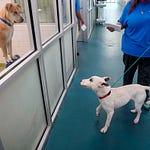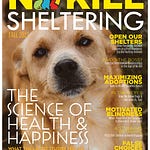‘Gumdrop’ was the first ‘pit bull’ to be adopted in Denver after the 30-year ban was repealed. But he wasn’t the last. ‘The Denver Animal Shelter found homes for 100 pit bulls in 2021, enough to make the newly legalized dogs the second-most adopted breed at the shelter.’
These are some of the stories making headlines in animal protection:
Manatee County, FL, “approved a new ordinance that prevents the killing of feral cats. The changes are a result of a Manatee County woman’s loss and efforts to save other cats from the same fate” when her neighbor had the community cats she cared for trapped and killed.
1,062,127 animals found homes during the “Home 4 the Holidays” pet adoption drive between Thanksgiving and New Year’s Day. That’s 1,062,127 animals who no longer face the needle.
The Labrador Retriever was named the “most popular” dog breed for the 31st year in a row. But it’s not really true. Despite AKC press releases making that claim and headlines parroting it, mixed breed dogs always take the top spot. And it isn’t even close.
On the heels of the McPlant burger at McDonald’s and Chipotle’s vegan chorizo, KFC adds plant-based “chicken” at all U.S. locations.
“Gumdrop” was the first so-called “pit bull” to be adopted in Denver in 30 years after the ban was repealed. But he wasn’t the last. “The Denver Animal Shelter found homes for 100 pit bulls in 2021, enough to make the newly legalized dogs the second-most adopted breed at the shelter.” Banning dogs based on how they look is immoral. It is also ineffective. That's not just opinion; it's science: 50% of dogs labeled as pit bulls lacked DNA breed signatures of breeds commonly classified as pit bulls; Dogs targeted for breed discriminatory laws are not more likely to bite, do not bite harder, and such bans do not result in fewer dog bites or bite-related hospitalization rates; and, Enforcement of the ban is expensive with no measurable impact on public safety. Bans also negatively impact surrounding communities and rescue groups who have to take on the burden for such regressive and selfish policies in order to save the lives of these dogs. “When a city has a breed-specific ban, good dogs die. It’s that simple.”
As companies seek to bring employees back to the office, human resources professionals are reporting increased calls for their pets to come, too: “more job seekers are looking at pet-friendly benefits and policies in evaluating a potential employer.” This is not just good for dogs, it is good for the bottom line. Studies have found that the presence of dogs in the workplace reduces stress, increases social interactions, leads to improved performance (including fewer errors), longer work hours, reduced absenteeism, and reduced turnover.
The New Hampshire Legislature is set to decide whether to create a committee that will study how to curtial rental housing discrimination for tenants whose families include dogs and cats. Protecting those tenants will not only keep families together, reduce shelter intakes, and increase adoptions, it will benefit landlords, public health, and local businesses.
Last May, the Green River City Council in Wyoming was asked to vote on getting rid of the gas chamber to kill animals at its local pound. Not one city councilmember seconded the motion and it failed to pass. But after a series of public protests by local citizens, the Mayor has directed staff to come up with a plan to replace gas killing.
New Jersey legislators were set to pass a bill that would have allowed courts to order defendants in animal cruelty cases to pay for the costs of animal care and if they fail to do so, forfeit the animals, before conviction. Unfortunately, the bill would have also allowed New Jersey shelters/pounds to kill those animals once they are granted full custody. Seizing animals being subjected to violence and then allowing pounds to commit the ultimate form of violence on them – killing – is a gross betrayal, not only adding insult to a life of injury, but taking us further – not closer – to the goal of animal protection. The No Kill Advocacy Center’s requested amendments to further protect animals were not adopted, but the bill ultimately failed to pass.
The director of the Memphis, TN, pound is violating the law by refusing to provide the medical records of animals to citizens who request them in order to hide why some animals are dying in their kennels and why others are being deliberately killed. She claims she is doing it to protect the “privacy” rights of animals under the federal Health Insurance Portability and Accountability Act (HIPAA), but such a claim is absurd. One reason why is that a Federal Court has already ruled that, “There is no veterinarian privilege, no animal equivalent of the Health Insurance Portability and Accountability Act, and no case law suggesting that humans and animals are entitled to the same level of privacy.”
Food for thought:
In Part 3 of our podcast history of U.S. animal sheltering, Jennifer and I tell the story of the creation of the first No Kill community. We also discuss the subsequent spread of the No Kill Equation model of sheltering nationwide — efforts that continue to spare the lives of millions of animals every year.
A new study finds that people who live with dogs drive more — and the more dogs they have, the more miles they drive. A fair number of those car trips are to recreate with dogs, like hiking, walking, and playing off-leash. For purposes of reducing traffic, carbon emissions, and improving the quality of life for dogs and dog lovers, urban planners are urged to make their cities more dog-friendly.
Shelters are stressful places for dogs and they can also be stressful places for potential adopters. Several recent studies, however, demonstrate how to make shelters more welcoming for both: 1. Give dogs the ability to see other dogs; 2. Doggy roommates; 3. Lots of treats; and 4. Sniff holes.
Cats often fare poorly, too. Making a shelter cat happy is simple according to a recent study: lots of cuddles.
As more people turn to rescue and adoption and more shelters embrace progressive policies, the number of communities placing over 95% and as high as 99% of the animals is increasing.
Fremont County, CO, had its best year ever. It reported a 99% placement rate for dogs, 98% for cats, and it placed all but one other animal.
Ames, IA, also reported a 99% placement rate for dogs, 98% for cats, and 96% for rabbits and other animal companions.
Flathead, MT, reported a 96% placement rate for dogs and 94% for cats.
These communities and the data nationally prove that animals are not dying in pounds because there are too many, because there are too few homes, or because people don’t want the animals. They are dying because people in those pounds are killing them. Replace those people, implement the No Kill Equation, and we can be a No Kill nation today.
And, finally, a legal fight is being heard in a Boston, MA, courtroom between a rescue group which wants to amputate a young dog’s leg because of complications from a prior fracture and ongoing infection and the dog’s foster mom, who wants to adopt Kirklin and first try surgery to save the leg (at her own expense).
According to media reports, the foster mom, “took it upon herself to get a second opinion from other veterinarians. Prior to something as drastic as an amputation, she would like to have the plate [in the dog’s leg] surgically removed to see if that allows the leg to completely heal.” The foster mom also said that Kirklin “made big strides in recent weeks since he started taking antibiotics. ‘It’s almost like you can’t even tell there was an issue… The improvement is tremendous.’”
To stop the amputation, she “hired an attorney to take the rescue organization to court and win ownership of Kirklin. ‘We came with our hands open, saying we would pay for surgery and pay for care of the dog’... The dog is perfectly fine. Just let us adopt…”
In a statement, the rescue group disputes that the dog is fine. They note that they, “paid for surgery to try to save his limb and a metal plate was installed. Following surgery, Kirklin was required to be on restricted rest for several months so that his bones could fuse, and he could continue to utilize his front leg,” but the plate failed. They further note that, “The veterinary partners that we rely on as an organization have advised that amputation of the leg is the most clear-cut pathway to recovery. He is suffering in great pain but his happy-go-lucky nature and pain medication masks this. The bottom line is that Kirklin is suffering from a painful infection that could become systemic and life threatening… While it breaks our heart to see dogs who have undergone injuries that result in amputations, those of us who know dogs know that they adjust very quickly to life on three legs, especially when it is a front leg.”
The rescue group’s attorney argued in court that, “It’s not her decision because she doesn’t own the dog. If this foster is allowed to just arbitrarily say, ‘No, it’s my rules now,’ that will bring down the entire foster system.”
Both sides have compelling arguments and both sides seem to be motivated by what they believe is in the best interest of the dog. And that suggests how the court should rule. Rather than decide the issue of “ownership” of the dog, the court could decide what is in the best interest of the dog.
Animals have rights independent of the people they are connected to — or at least they should. Thankfully, more and more of our laws are enshrining those rights into law: in cruelty, divorce, and probate cases. But animals need more legal recognition. They need legal personhood, which will protect them in all cases where an animal’s best interest might be in conflict with that of the people around him/her, as courts do for children and other at-risk groups. A guardian ad litem appointed by the court to be Kirklin’s attorney would give him such a voice.
“Both sides made their arguments in court this week, but the [court] has yet to issue a decision.” And before it does, it would be a good idea to hear from Kirklin, too.















This Week in Animal Protection